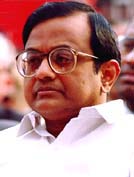Commentary / Mani Shankar Aiyar
It might embarrass Chidambaram now to stand by his 1991 denunciation of his present political
partner, the chief minister of Tamil Nadu
 The charge against the DMK state government is that the DMK sided
with the LTTE and connived in its attempts at eliminating its
rivals on Indian soil, specifically in the assassination by the
LTTE of EPRLF leader Padmanabha and 15 of his associates in Madras
in June 1990.
The charge against the DMK state government is that the DMK sided
with the LTTE and connived in its attempts at eliminating its
rivals on Indian soil, specifically in the assassination by the
LTTE of EPRLF leader Padmanabha and 15 of his associates in Madras
in June 1990.
The charge against the V P Singh government at the
Centre is that it turned a blind eye to the doings of its National
Front partner, the DMK, despite central agencies bringing to the
attention of the Centre massive evidence of the DMK's collaboration
with the LTTE.
The evidence before the commission of the DMK-LTTE nexus is to
be found particularly in the affidavit filed by Tamil Nadu Congress
Committee president Vazhapadi K Ramamurthy, and the depositions
already made by Ramamurthy, Chandra Shekhar, Subodh Kant Sahay,
among others.
Although Karunanidhi's home secretary, R Nagarajan,
has denied any personal knowledge of the political relations between
the DMK and the LTTE, he has confirmed to the commission the statement
made by him before a judicial magistrate in Trichy in November
1991, where he had detailed the deliberate delay, on the instruction
of chief minister Karunanidhi, in pursuing the killers of Padmanabha;
the involvement of Karunanidhi's son, Azghagiri, in springing
arrested LTTE activists; the role of DMK ministers and legislators
in respect of specific misdemeanours and worse of LTTE cadres;
and the general atmosphere of collaboration in which the LTTE
was operating in Tamil Nadu before and after the Padmanabha murders.
Jayalalitha's deposition will be of absorbing and special importance.
She had submitted a confidential 102-page memorandum to Prime
Minister Chandra Shekhar on December 29, 1990, detailing evidence
of Karunanidhi's links with the Prabhakaran gang which Chandra
Shekhar found sufficiently irrefutable as to base his dismissal
of Karunanidhi's lawyers and Karunanidhi in person; reciprocally,
Karunanidhi can expect to have a really rough time exculpating
himself or damning Jayalalitha. It is one thing to win an election,
quite another to be compelled to tell the truth, the whole
truth and nothing but the truth on oath.
The commission has also taken on to its record P Chidambaram's
90-minute speech in the Lok Sabha on February, 25, 1991, in which,
with chilling clarity, he has accused the DMK government and its
leader, Karunanidhi, of being accessories before and after the
fact to the Padmanabha massacre, as also the mountain of evidence
relating to the DMK-LTTE nexus which justified the dismissal of
that government.
Chidambaram is also privy, as Rao's minister
for the investigation into the Rajiv assassination, to the implications
of the DMK-LTTE, nexus in Rajiv's death. It might embarrass Chidambaram
politically now to stand by his 1991 denunciation of his erstwhile
political foe and present political partner, the chief minister
of Tamil Nadu.
But the commission is not going to be swayed by
these political considerations. Either Chidambaram will have to
confirm what he then alleged; or explain why the allegations he
then made were without foundation.
In particular, Chidambaram will have to tell the commission --
perhaps in camera -- of what he as minister did little
or nothing in this regard. He might have to explain to the commission
whether any failure to follow his own leads was because he was
working on forging an alliance with the DMK. There is no doubt
that ever since Chidambaram was attacked by AIADMK cadres at Trichy
airport in 1991, he had been in the forefront of the search for
an alternative to the AIADMK-Congress alliance that had won an
overwhelming victory in the 1991 election.
That result was the
consequence largely of the Tamil electorate's conviction that
the DMK-LTTE nexus was responsible, at the very least, for setting
the state for the assassination of Rajiv Gandhi on Tamil soil
in the middle of an election which looked as if it might lead
to the reinstallation as prime minister of a man who was the common
political enemy of both the DMK and the LTTE.
It has been confirmed to the commission that at least six of the
accused in the Padmanabha murders are also accused in the Rajiv
assassination. The DMK-LTTE nexus, if any, is not only a matter
of general relevance to the 'sequence of events' leading
to the assassination but of specific relevance to the question
of whether the links forged in the context of the Padmanabha murders
persisted after the dismissal of the DMK government.
If so, what
bearing did the DMK-LTTE nexus have on the assassination just
110 days later of Rajiv Gandhi by virtually the same LTTE hit-squad
that had massacred Padmanabha and then, according to Chidambaram,
received the patronage and protection of the DMK?
If the question interests you, please stay turned in to the Jain
Commission's proceedings. For five years, the Jain Commission
has been unmitigated Dullsville. At long, long last, the time
has come for all good men and true to sit up and start taking
notice.
|





 The charge against the DMK state government is that the DMK sided
with the LTTE and connived in its attempts at eliminating its
rivals on Indian soil, specifically in the assassination by the
LTTE of EPRLF leader Padmanabha and 15 of his associates in Madras
in June 1990.
The charge against the DMK state government is that the DMK sided
with the LTTE and connived in its attempts at eliminating its
rivals on Indian soil, specifically in the assassination by the
LTTE of EPRLF leader Padmanabha and 15 of his associates in Madras
in June 1990.